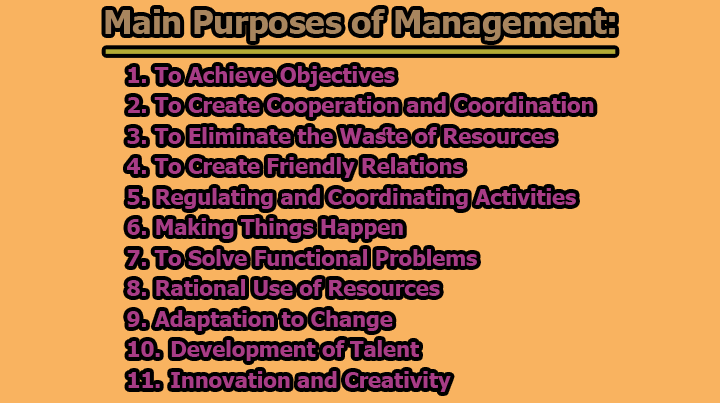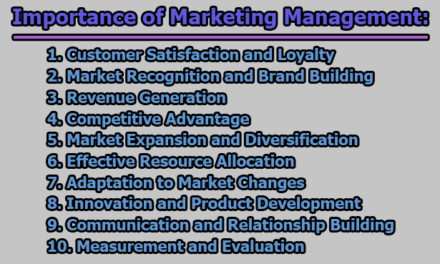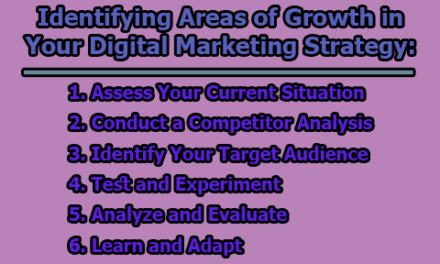Main Purposes of Management:
Management is a fundamental aspect of any organization, be it a business, non-profit, or government entity. It serves as the driving force that propels an organization toward its goals and objectives. At its core, management involves a set of activities aimed at efficiently and effectively utilizing resources to achieve predetermined goals. The purposes of management are multifaceted and encompass a range of essential functions that contribute to an organization’s success. In this article, we will delve into the main purposes of management, exploring how they collectively work to ensure the smooth functioning and growth of an organization.
1. To Achieve Objectives: Management is responsible for setting clear and achievable objectives that align with the organization’s mission and vision. These objectives serve as guiding beacons, directing the efforts of all departments and employees toward a common goal. Managers develop strategic plans outlining the steps required to reach these objectives, considering factors such as market conditions, competition, and available resources. Regular monitoring and evaluation help ensure progress, and adjustments can be made if necessary to keep the organization on track.
2. To Create Cooperation and Coordination: Effective management encourages collaboration and synergy among different departments and individuals. Managers foster an atmosphere of open communication, where teams share information, ideas, and feedback. Regular meetings and cross-functional projects help bridge gaps and facilitate coordination, preventing silos and promoting a holistic approach to problem-solving.
3. To Eliminate the Waste of Resources: Resource management involves careful planning and allocation of finances, human capital, and materials. Managers analyze resource needs against the organization’s objectives to allocate them efficiently. This includes budgeting to prevent overspending, optimizing workforce utilization to prevent overstaffing or burnout, and minimizing waste in production processes. Monitoring key performance indicators helps identify areas where resource use can be further optimized.
4. To Create Friendly Relations: A positive workplace culture is fostered by effective management practices. Managers lead by example, promoting respect, empathy, and open communication. This creates an environment where employees feel valued and supported, leading to higher job satisfaction and motivation. Regular feedback, recognition programs, and opportunities for personal growth contribute to building strong relationships within the organization.
5. Regulating and Coordinating Activities: Management establishes clear processes, protocols, and guidelines to ensure that operations run smoothly and efficiently. By defining roles and responsibilities, managers reduce confusion and conflicts. They also monitor and adjust workflows as needed to maintain optimal performance. This regulatory role ensures that the organization’s activities align with its objectives and adhere to legal and ethical standards.
6. Making Things Happen: Translating strategies into actionable plans requires effective execution. Managers break down strategic goals into manageable tasks, delegate responsibilities to appropriate individuals or teams, and set timelines for completion. Regular follow-ups and progress reports ensure that tasks are being completed on schedule and any issues are promptly addressed.
7. To Solve Functional Problems: Problem-solving is integral to management. When challenges arise, managers use analytical skills to identify the root causes and explore potential solutions. They may collaborate with relevant stakeholders to brainstorm ideas and implement effective strategies. This approach not only resolves immediate issues but also strengthens the organization’s ability to handle future challenges.
8. Rational Use of Resources: Management carefully allocates resources based on priorities and needs. Financial resources are budgeted strategically, focusing on initiatives that generate the most value. Human resources are assigned based on skillsets and competencies, optimizing workforce productivity. Material resources are sourced efficiently to prevent excess inventory or shortages.
9. Adaptation to Change: In a rapidly changing environment, management plays a vital role in guiding the organization through transitions. This might involve restructuring to align with market shifts, adopting new technologies to streamline processes, or diversifying products/services to stay relevant. Managers ensure that the organization remains agile and can capitalize on emerging opportunities.
10. Development of Talent: Management recognizes that employees are valuable assets and invests in their growth. This includes identifying training needs, offering skill development programs, and providing opportunities for advancement. By nurturing employee potential, managers enhance workforce performance, job satisfaction, and overall organizational capability.
11. Innovation and Creativity: Management encourages a culture of innovation by providing an environment where novel ideas are not only accepted but actively sought. Managers foster a safe space for employees to share creative concepts, take calculated risks, and experiment with new approaches. This approach often leads to breakthroughs, improved processes, and a competitive edge in the market.
In conclusion, the main purposes of management collectively contribute to an organization’s success and sustainability. From achieving objectives to fostering cooperation, eliminating wastage, and promoting friendly relations, management serves as the cornerstone that holds an organization together. By regulating activities, facilitating execution, and solving problems, management ensures that an organization navigates challenges, optimally utilizes resources, and adapts to changing circumstances. As the business landscape evolves, the role of management becomes even more critical, guiding organizations toward growth, innovation, and enduring success.

Library Lecturer at Nurul Amin Degree College










